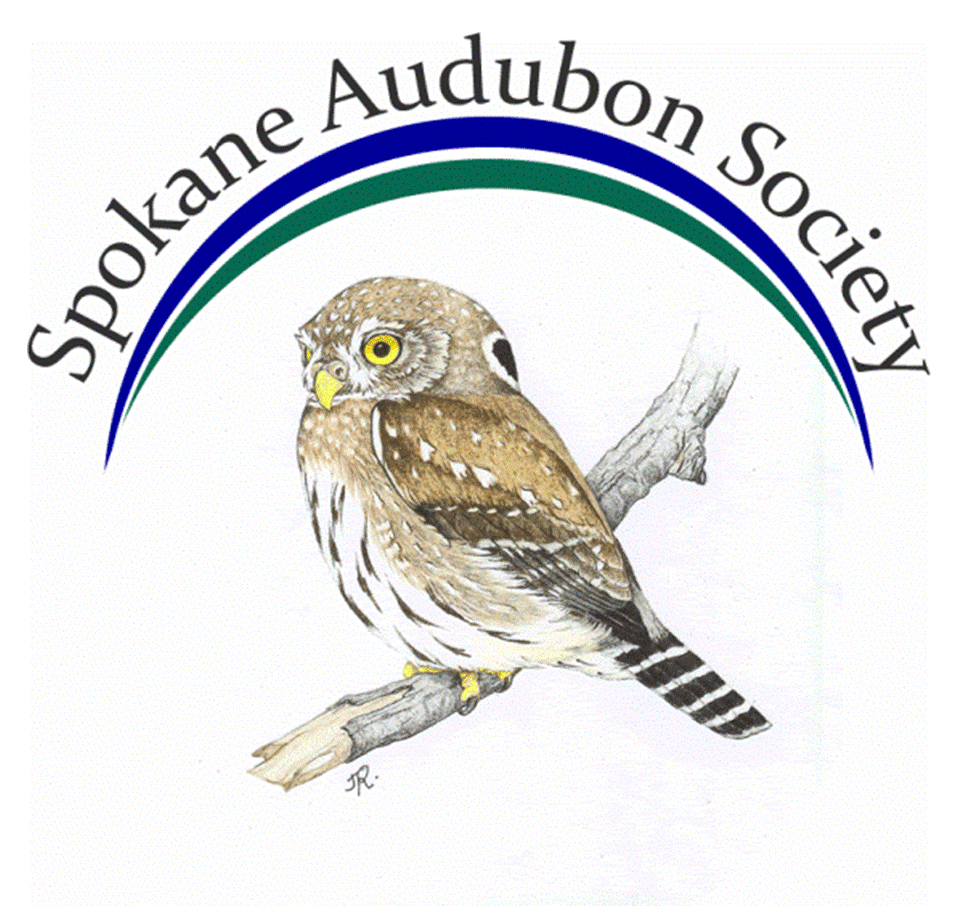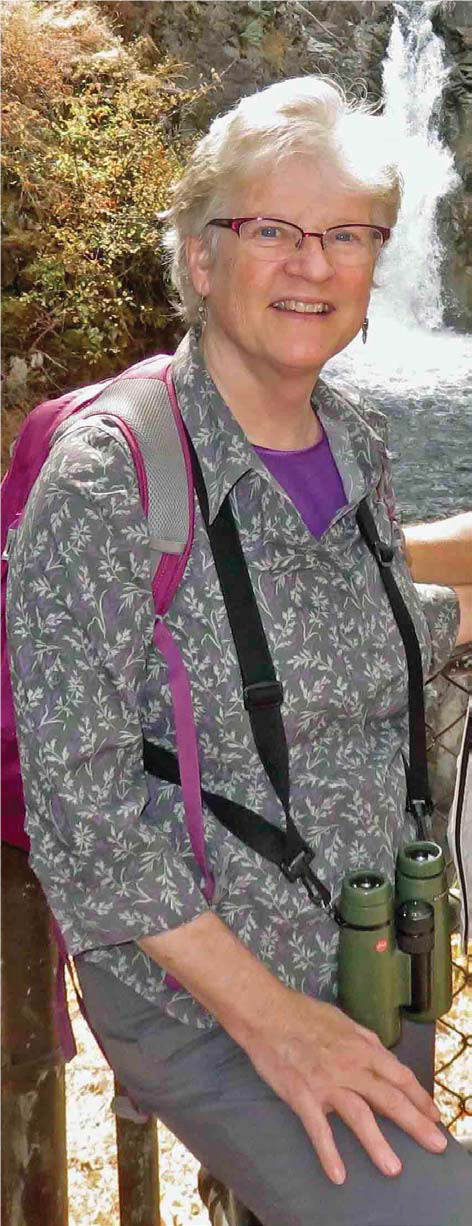Lisa birding in Stamp River Provincial Park near Port Alberni, Vancouver Island, BC.
Lisa Langelier
by Madonna Luers
Lisa Langelier, our current vice-president, has been on the Spokane Audubon Society board since 2016. She has been a chapter member since 1994 and involved with other Audubon chapters throughout the West for over 30 years.
“I wanted to contribute to a functioning chapter,” she says about joining the board at a time when the chapter needed additional leadership. Her contribution, other board members say, has been particularly valuable because of her experience as a professional wildlife manager.
Lisa started serious birding in the late ‘70’s when she was studying wildlife at the University of Idaho. After graduation with a Bachelor’s degree in Wildlife Resources, she worked on bird surveys on the Okanogan National Forest in northcentral Washington. On that project she and other wildlife researchers teamed up with the “bug people” (Forest Science lab entomologists) who were looking at spruce budworm outbreaks. Lisa’s group looked at forest bird predation on budworm. They captured birds in mist nets and kept them in enclosures to precisely observe their foraging on insects. Among the birds she handled were evening grosbeaks, pine siskins, black-capped and mountain chickadees, red-breasted, white-breasted and pygmy nuthatches, chipping sparrows, and “the best forager of them all,” western tanagers. A study of habitat selection of these species became her Master’s degree thesis, with additional research at sites near LaGrande, Oregon, McCall, Idaho, and Seeley Lake, Montana.
A life-long animal lover, Lisa was born in 1955 in Nashua, New Hampshire. After high school she moved to Boston, working for a year to establish residency so she could attend the University of Massachusetts’ veterinary science program. While studying to be a veterinarian, she participated in an exchange program with the University of Idaho, where she eventually transferred and changed her major to wildlife.
Red-breasted Nuthatch (photographed by Gerri Vyn).
White-breasted Nuthatch (photographed by Nick Saunders).
Lisa first worked for the U.S. Fish & Wildlife Service (USFWS) as a six-month temporary biologist in Moses Lake, assessing the wildlife impacts of the Columbia Basin Irrigation Project. She worked as a habitat biologist for the Washington Department of Game out of the Walla Walla and Burbank offices. She moved to Boise where her future husband Bruce Kessler worked, and developed a volunteer program as an education specialist for The Peregrine Fund’s World Center for Birds of Prey. When her husband transferred to Boulder, Colorado, Lisa started a wildlife education program for the Rocky Mountain Arsenal as it was becoming a new national wildlife refuge, for which she later served as assistant manager.
Lisa became manager of the USFWS’ Little Pend Oreille National Wildlife Refuge in northeast Washington in 1994. By 2008, USFWS combined the refuge into a management complex with Kootenai National Wildlife Refuge in North Idaho and Turnbull National Wildlife Refuge near Cheney, and Lisa was transferred to Turnbull as complex manager. She retired from that position in 2013 when a cancer diagnosis had her re-thinking how she wanted to spend her time.
Pygmy Nuthatch (photographed by Ian Routley).
Neither her husband nor daughter are serious birders, but Lisa has taken opportunities to look for birds in family travels to Africa, Australia, and other places. During her career travels to conferences, she often squeezed in birding. She’s participated in birding trips to Texas, Mexico, California, and her favorite, Costa Rica, where she and other retired USFWS employees saw at least 320 species.
It’s difficult for Lisa to pick a favorite bird species, but she’s always been fond of nuthatches and loves that Eastern Washington has all three species of them.
Her tip for new birders is to practice getting the “whole gestalt of a bird” – look at the size, shape, darkness and lightness to help identify it. Go with people who know birds and listen to bird song tapes.
Lisa says the most important issue for birds and birding is how habitat change and climate change are so inextricably linked. She’s also not very hopeful about the current federal administration addressing that.
“A lot of what I devoted my career to is being undone now by greed,” she said. That’s why, she agrees, the awareness-raising efforts of organizations like Spokane Audubon are more important now than ever.










